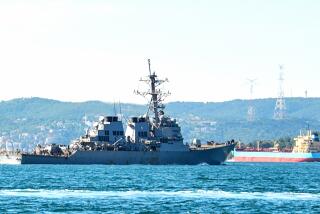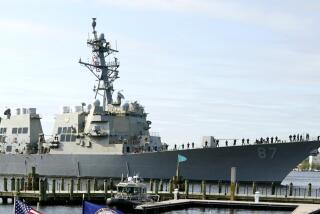THE MERCHANT MARINE AND THE IRAQ EMBARGO
- Share via
Contacted by telephone in New Jersey, John McPhee commented to a Times reporter on the implications of the Persian Gulf crisis for the American merchant marine and vice versa.
“It’s suddenly become very easy to get a job,” he said. His book, “Looking for a Ship” (Farrar, Straus & Giroux), deals extensively with recent competition among merchant seamen for scarce work. Because of the American military buildup in the Persian Gulf, “Every available ship has been pressed into service,” and work is no longer scarce.
But if work is suddenly abundant on the merchant fleet, it remains true that the fleet itself is a shadow of what it once was. “During the past 10 or 15 years, the fleet has shrunk by 85%,” and at the present moment, “No ship is under construction in any shipyard in the United States, none at all, none whatsoever.”
Shipbuilding is down worldwide, McPhee says. Though the Koreans and the Germans have continued some shipbuilding and the Japanese may not be completely out of the business, the Scandinavians, he says, to name a one-time shipbuilding giant, have quit the game altogether. That the United States has done the same, McPhee implies, may yet be cause for national regret.
McPhee’s book reports the astonishing fact (see adjoining review) that most merchant ships are, by design, defenseless against piracy. Even a small, armed boarding party can steal whatever cargo it wishes. The skeleton crews that man the gigantic cargo vessels have no alternative but to stand by and watch the theft take place.
What then of American forces seeking to blockade Iraq? Would small armed boarding parties be enough to force merchant ships bound for that country to change course, return to harbor, etc.? McPhee thinks that the answer is quite possibly yes. Our memory of World War II, he says, is of cargo ships sunk, not of cargo ships seized. But much may change in a new era of essentially unarmed merchant shipping.
More to Read
Sign up for Essential California
The most important California stories and recommendations in your inbox every morning.
You may occasionally receive promotional content from the Los Angeles Times.












